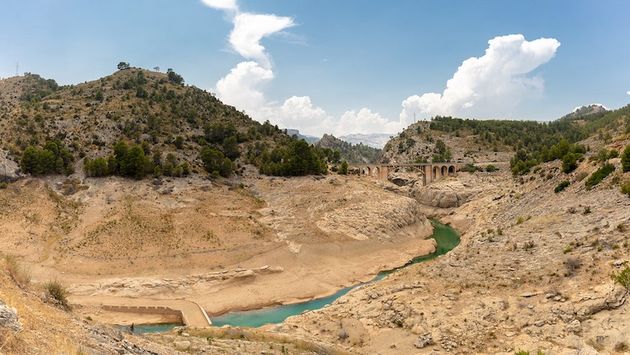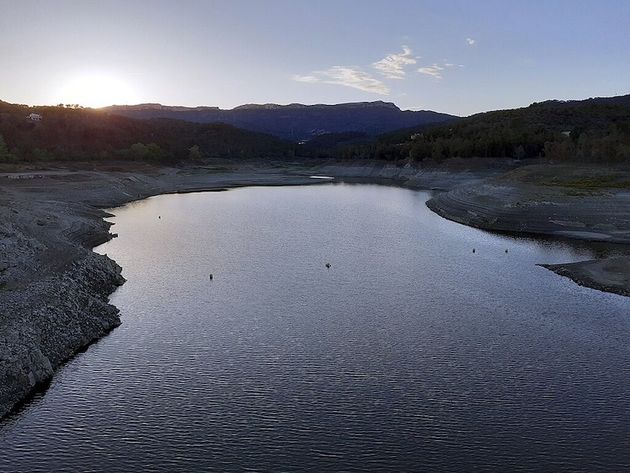The drought affects 34.5% of the Spanish territory. Christian geographer Michael Wickham analyses the water crisis that hits the Mediterranean region of Europe.
![The church of Sant Romà, once covered by water, in a reservoir in Catalonia that is at 5% of its capacity. / [link] Amad Alvarez[/link], Wikimedia Commons.](https://cms.evangelicalfocus.com/upload/imagenes/65ccc0e390759_SantRomanos.jpg) The church of Sant Romà, once covered by water, in a reservoir in Catalonia that is at 5% of its capacity. / [link] Amad Alvarez[/link], Wikimedia Commons.
The church of Sant Romà, once covered by water, in a reservoir in Catalonia that is at 5% of its capacity. / [link] Amad Alvarez[/link], Wikimedia Commons.
The drought situation in Spain continues to lengthen and worsen in some regions, with up to 34.5% of the Spanish territory in a state of alert or emergency.
In Catalonia, 80% of the population (around six million people) are in an emergency situation and restrictions have been imposed on consumption per inhabitant per day (200 litres) throughout the provinces of Barcelona and Girona, as well as in 200 other municipalities.
In the south, Andalusia is another of the most affected regions by the drought crisis. The regional government has also placed a large part of its territory in an emergency situation.
“This is not the first drought in those regions, but from the historical data we have since 1805, it does seem to be the most serious, and January was the hottest month on record”, geographer Michael Wickham told Spanish news website Protestante Digital. “The situation in Catalonia is very unusual and worrying”, he added.
Mediterranean areas are particularly vulnerable to drought, as Wickham explains. “There are two types of rainfall: torrential rain, in autumn, when cold air arrives from the north and coincides with very warm, moist air from the Mediterranean Sea, producing the dreaded and the destructive so-called cold drops; and normal winter rainfall, the remnants of Atlantic fronts”.
“As the air descends to the Mediterranean coastal plains from the plateau, it compresses, it warms up. There is no condensation, and therefore less rain”, the geologist adds.
Furthermore, the “current global warming is producing more heat every year, and therefore more torrential rain in coastal areas, as well as less snow”.

For Wickham, the drought is no surprise. “Evidence from rainfall and temperature records over the last few decades shows a clear decrease in rainfall in the Mediterranean basin, as well as an increase in temperatures, due to the global rise in temperature that began in the 19th century”.
“This increase is related, as confirmed by the vast majority of the scientific community, to emissions of greenhouse gases such as CO2”, he underlines.
Wickham also mentions “water wars” as a result of poor political planning, a lack of capacity to reach agreements and “the human selfishness, with its pluralistic extension into regionalism and nationalism”.
One example of this could be seen in Israel, because the waters of the Jordan river are diverted through a large pipeline to the flatter, drier south of the country, reducing water to countries such as Jordan. On a larger scale in the same region, there is the conflict over the water use of the Euphrates and Tigris, as the upper reaches of their basins are in countries such as Turkey, Syria and Iran, “all pulling from the tap with dam and irrigation projects”.
The Nile, with Ethiopia, Sudan and Egypt is another river “with conflicts”, as is the Parana in South America.
“There have been and are many water wars in the world, and they are likely to get worse”, laments Wickham.

[photo_footer] The Riudecanyes reservoir in Tarragona, Catalonia in April 2023. / Jordi Gili , Wikimedia Commons [/photo_footer]
The geographer believes that the water problem requires a biblical reflection that involves 4 key points.
First, the idea of being “pilgrims in this world” tied to the need to “cling to God, to live a life of faith and dependence on Him, who owns everything and controls everything”. “This affects how we consume, even water and energy”, he says.
Secondly, Wickham points to the confidence of the church in “God's care for his people” and how that should help us not to fall into “the extreme of anxiety”.
Thirdly, love for others as a key that can help to change the overall mentality. “I reduce my consumption to help others. I realise that the way I live directly and indirectly impacts the lives of others who live with the consequences of global warming, and that I live with consumption patterns that are part of the harmful emissions of CO2 and other gases. That is radical for many, but it is what the Lord Jesus did”, he stresses.
Finally, Wickham mentions accountability and the inevitable pattern of judgement that comes from the Bible, also to assess the relationship with the created order. “God commands us to be 'faithful gardeners and stewards'”, he concludes.
[analysis]
[title]One more year[/title]
[photo][/photo]
[text]At Evangelical Focus, we have a sustainability challenge ahead. We invite you to join those across Europe and beyond who are committed with our mission. Together, we will ensure the continuity of Evangelical Focus and Protestante Digital (Spanish) in 2024.
Learn all about our #OneMoreYearEF campaign here (English).
[/text][/analysis]

Las opiniones vertidas por nuestros colaboradores se realizan a nivel personal, pudiendo coincidir o no con la postura de la dirección de Protestante Digital.
Si quieres comentar o